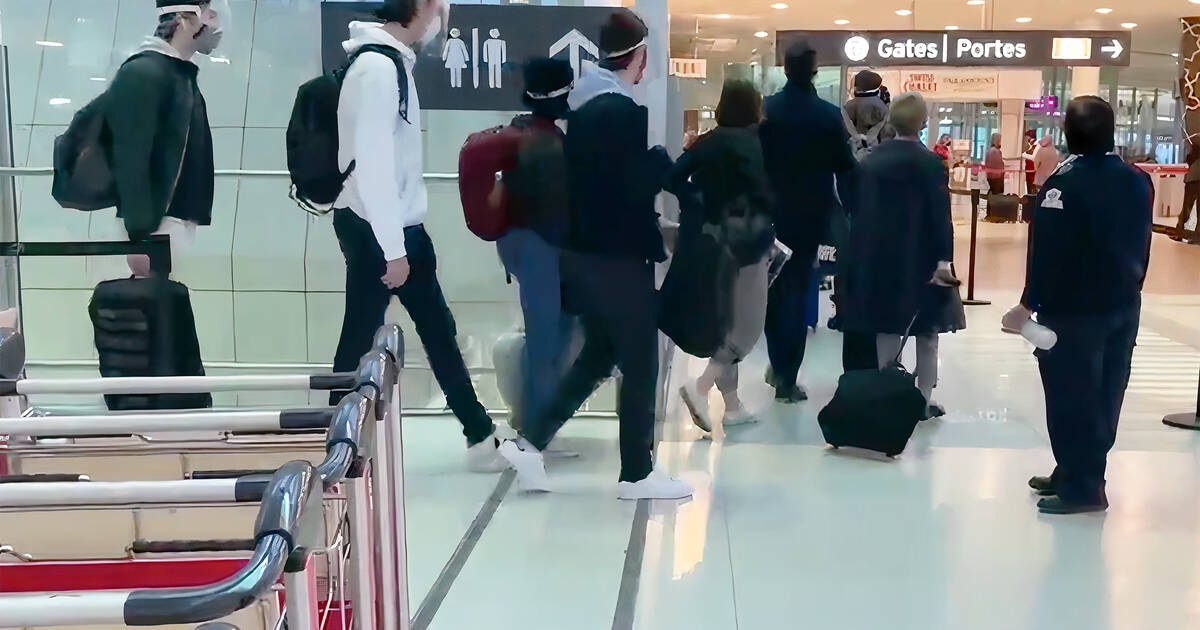
The province of Ontario may be under full lockdown at the moment, but you wouldn't know it by looking at our busiest airport, Toronto Pearson International.
Who shall we fine for hosting the circus that's happening at Toronto Airport... Trudeau? pic.twitter.com/rIXuESYOUz
— Torguy68🇨🇦 (@Torguy68) December 28, 2020
The hub has apparently been teeming lately, with people jetting off or returning home over the holidays despite the fact that residents have been asked to avoid all non-essential travel since the onset of the pandemic more than nine months ago.
While the heavy-handed blanket shutdown of the vast majority of operations in the province went into effect on Dec. 26, residents have been posting accounts of long lineups and crowded terminals at Pearson, where people are mandated to wear face coverings at all times up to and including during their flight.
But despite measures, dozens of flights carrying the communicable disease — including its new variant — have landed in Toronto in the past few weeks alone.
Ontario is NOT shut down province wide. Here is the Toronto airport pic.twitter.com/Xdk70xNyOX
— Laura Nash (@Laura1Nash) December 26, 2020
Excess unnecessary travel both within and outside of the province is one thing that Premier Doug Ford has blamed for high case counts and continuing shutdowns. He's gone as far as calling on the federal government to be more vigilant with testing and monitoring new arrivals, roughly 25 per cent of whom aren't properly quarantining as per national guidelines.
"As people are flowing in, we're doing nothing. But I can promise the people of Ontario that I'm not waiting for the federal government anymore," Ford said at a presser last week. "My concern is about international travellers: at minimum they should be tested at the airport."
Rapid testing & risk mitigation: the need couldn’t be greater. As #CPC advocates common sense, Trudeau on another “personal day”. Pearson International yesterday 👇👇👇pic.twitter.com/mbF1C2CjFC
— Rowan (@canmericanized) December 27, 2020
The lack of screening at Canada's busiest airports is something that has been criticized amid heightened restrictions on small businesses and individuals, who have now been asked to avoid all trips outside their homes save for getting groceries, medication or other necessities.
Many are wondering why residents could not get together with their family over the holidays due to the moratorium on private indoor gatherings, but are permitted to pack terminals and planes for vacations.
Agree completely. Mom and Dad can’t come for dinner but Toronto airport is packed to the gills today. Absolutely astonished at the level of stupidity displays by our so-called leaders. (And people that want to follow them)
— Dr. sickofitall (@sickofi42740715) December 26, 2020
Rapid testing at our borders, at the very least, is something Ford and other officials have urged to help mitigate the spread of COVID-19 and its new variant as residents of Toronto and Peel go into their sixth week of the most severe iteration of pandemic lockdown.
Though the Canada-U.S. border has technically been closed since March, Canadians have been able to travel fairly freely by air without being extensively grilled on whether their trip is essential.
As has continued to be the case, people are understandably taking issue with the inequity of allowing large groups of people to congregate to hit up big box stores and hop on flights with lax enforcement of health and safety measures, but not independent businesses that are suffering more than ever right now.
Do the same laws that had 100 police at @adamsonbarbecue apply to @TorontoPearson ? Are these people at risk or is there no risk @fordnation ? pic.twitter.com/LeikZDzhIp
— Joe Warmington (@joe_warmington) December 26, 2020
With the population awaiting mass availability of the vaccine, there have been more than 2,000 new cases of the virus per day for the majority of the last few weeks, with per cent positivity among those tested hovering around 3.75 per cent.
The mortality rate for the virus remains around 2.6 per cent, with the vast proportion of deaths in those 80 and over.
Thus far, there have been 175,908 COVID-19 cases — 151,562 of them resolved — and 4,455 deaths in Ontario.






0 comments:
Post a Comment